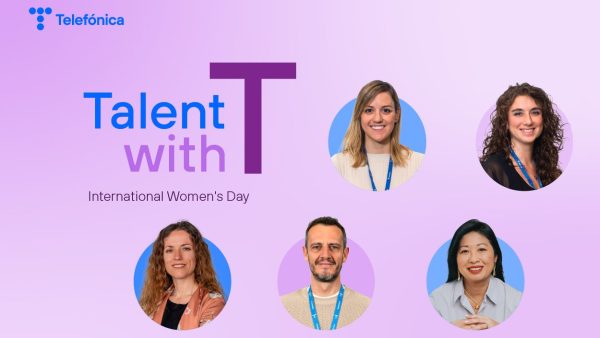One of these studies was the ADIM project, “Advancing LGBT diversity management in the public and private sector”, funded by the European Union and in which 16 companies in Spain and Portugal participated in 2019. Through this study, at Telefónica we carried out a diagnosis of this reality among our employees, which allowed us to learn that the majority of our LGBT+ colleagues prefer to avoid talking to their bosses or team about their partner or family. This could simply be because they are wary of their privacy, but the reality is that, among other reasons, they were afraid of being whispered about or having their professional development penalised.
It’s hard to believe, isn’t it? At this stage of life, adults are still afraid to be themselves in front of other adults, and feel anxious about a simple coffee with their colleagues after a holiday, prefer not to go to a team-building meeting or even prefer not to claim their days off when their partner is admitted to hospital or to go on a honeymoon. Considering that only 38% of LGBT+ people in Spain are out of the wardrobe at work, it is clear that organisations have a major challenge ahead of them.
The importance of awareness-raising
For this reason, at Telefónica, in addition to having a Diversity and Inclusion Policy and making available our Whistleblowing Channel, which allows you to report anonymously or personally any case of harassment or discrimination, we have worked on multiple awareness campaigns, with a special focus on Pride month, but without ceasing to carry out actions in other months of the year. Our courses, workshops, events and corporate videos have addressed topics such as the role of non-LGBT+ allies in achieving equality, lesbian visibility, bullying and harassment on social media, the reality of intersex people, the health and emotional well-being of LGBT+ employees and gender transition at work, among others.
In addition, we have affinity groups, present in geographies such as Spain, Brazil, the United Kingdom and Latin America, which allow us to align our actions with the interests and concerns of the LGBT+ community. Participation in external events and, particularly, in the main Pride marches in cities such as Madrid, London or São Paulo, also help to build environments where our employees feel valued and included.
The commitment to employment integration
In recent years, the commitment to the integration of transgender people in the labour market has been particularly relevant. In Spain, in addition to participating in FELGTBI+’s YesWeTrans project, we organise employability workshops for trans people at risk of exclusion and we have launched a guide to gender transition at work, which aims to guide both the transitioning employee and their manager throughout the process.
However, the commitment to LGBT+ inclusion is not just about employees. According to a recent study by Ipsos, in some countries in our footprint, such as Colombia, the UK, Spain and Brazil, the percentage of non-heterosexual people is between 10% and 14% of the total, and the figures are much higher in Generation Z. Taking this into account, in addition to being a question of talent and human rights, it is also a question of business. Companies must take into account in their innovation processes and in all communication channels and customer touch points that customers are diverse, and that ensuring an inclusive and attractive offer and experience for them has a direct impact on the bottom line.
The role of technology
On the other hand, technology is undoubtedly a key enabler for promoting people’s wellbeing, and indeed this is evident in our company’s mission. Businesses must have an inclusive perspective when developing our technologies, with the aim of ensuring that we not only improve the lives of people in general, but of all people, and leave no one behind[TBL1] .
It should be noted that LGBT+ people may be impacted by the use of technology in a particular way. For example, LGBT+ elders face older ageing with higher rates of loneliness and isolation than average, and often with weaker family networks. Technology can be an essential catalyst in facilitating their access to safe environments, where they do not feel discriminated against, reducing loneliness. It also has the capacity to provide accessible and affordable care services, especially for people living alone. Along these lines, training in digital skills, which forms part of Fundación Telefónica’s priorities, is presented as a necessary tool to reduce the digital divide affecting older people, which often leads to an even greater feeling of isolation and loneliness.
If we look at the youngest, all children or adolescents can be victims of bullying. However, there are certain criteria, such as sexual orientation or sexual identity, which expose young people to even higher than average rates of bullying. For example, a UNESCO study in 2022 indicated that 54% of LGBT+ people aged 13-24 have been bullied at school because of their sexual orientation and gender identity.
In a context in which the internet can act as a vehicle to reproduce these situations of harassment, companies must strive to make the internet a safer place by promoting training and awareness-raising initiatives in which children and their families can make the most of digital tools. Telefónica is therefore carrying out numerous awareness-raising initiatives on issues such as grooming, sexting, cyberbullying, digital violence, tolerance on the Internet, gaming and digital leisure, reaching around 10 million people by 2022.
The inclusion of LGBT+ people is, on the one hand, an opportunity for companies, both from the point of view of talent and from a business perspective. In addition, large companies like ours have a duty to have a positive impact on society, in our case by leveraging the potential of technology. In this sense, we have the obligation to develop our activity with a perspective of inclusion and diversity, leaving no one behind, and promoting the well-being of all people through technology.












